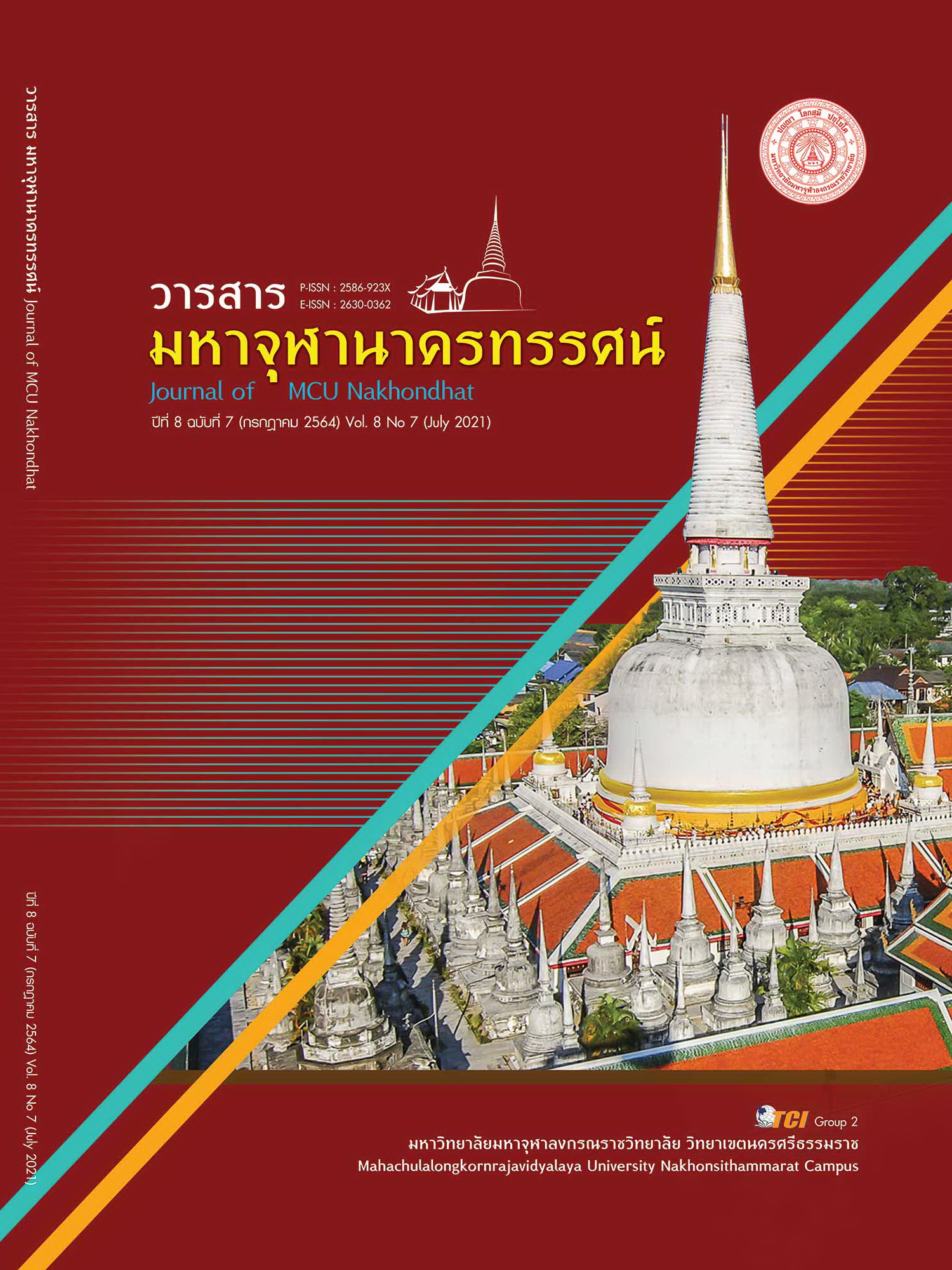REFORM OF BUDDHISM AFFAIRS IN EDUCATION USING THE PRINCIPLES SANGKHAHAWATTHU 4
Main Article Content
Abstract
Buddhism is one of the main institutions of Thai society. Most Thai people are Buddhists. And the influence of Buddhism has contributed to the traditions and culture of Thai life for a long time. With monks leading in spreading Buddhist principles and education is an important process in the propagation of Buddhism to exist until the present That education is accompanied by humans who have emerged in the world and problem solving Responsible to oneself and society Have a sense of responsibility for evil-good Are all from the influence of education. When entering the present era Technology plays a role in economic, social and political development, resulting in social change. New cultures continue to increase and Buddhism will inevitably be affected. Especially in education, still sticking to the original format. Such as organizing the education of the Dharma-Pali of the monks of the whole country at the central the curriculum was not enough to support youth interest in education. If there are more new courses There will be competition in Buddhism education. Has progressed as there is only one form of education in Buddhism in Thailand Lack of variety and lag Although giving some educational opportunities to marginalized people but it is not a study that can meet real needs. Therefore, the ecclesiastical education management should be suitable for the changing times by adhering to the Sangkhahavatthad 4 as the norm in modifying the Sangha Education system. Which is a principle for support Help each other In any form of change and amendment to the Sangha Education system, the common interests must be seen as important, For a stable and sustainable study of Buddhism in the future.
Article Details
References
พจนานุกรมฉบับราชบัณฑิตยสถาน. (2554). การปฏิรูป (Reform). เรียกใช้เมื่อ 3 มกราคม 2564 จาก https://library.mju.ac.th/pr/?p=12048
พระครูสังฆรักษ์ปัญญาพล ปญฺญาพโล. (2560). “การบริหารจัดการโรงเรียนพระปริยัติธรรมสู่ความเป็นเลิศ”. วารสาร มจร สังคมศาสตร์ปริทรรศน์, 8(2), 91-104.
พระไตรปิฎก. (2538). สฺยามรฏฺฐสฺส เตปิฏกํ เล่มที่ 4, 10, 11, 14, 19, 20, 22, 28, 35. กรุงเทพมหานคร: มหามกุฏราชวิทยาลัย.
พระธรรมปริยัติโสภณ (วรวิทย์ คงฺคปญฺโญ). (2548). การคณะสงฆ์และการพระศาสนา. (พิมพ์ครั้งที่ 3). กรุงเทพมหานคร: โรงพิมพ์มหาจุฬาลงกรณ์ราชวิทยาลัย.
พระพรหมคุณาภาณ์ (ป.อ.ปยุตฺโต). (2551). พจนานุกรม ฉบับประมวลธรรม. กรุงเทพมหานคร: โรงพิมพ์มหาจุฬาลงกรณ์ราชวิทยาลัย.
พระมหาสมพงษ์ เกศานุช และคณะ. (2561). “รูปแบบพัฒนาการจัดการศึกษาพระปริยัติธรรมแผนกธรรมและแผนกบาลีของสำนักศาสนศึกษาในเขตปกครองคณะสงฆ์ภาค 8”. วารสารวิชาการธรรมทรรศน์, 18(1), 1-12.
พระเมธีธรรมาภรณ์ (ประยูร ธมฺมจิตฺโต). (2539). การปกครองคณะสงฆ์ไทย. (พิมพ์ครั้งที่ 7). กรุงเทพมหานคร: สหธรรมิก.
มหาจุฬาลงกรณราชวิทยาลัย. (2539). พระไตรปิฎกภาษาไทย ฉบับมหาจุฬาลงกรณราชวิทยาลัย. กรุงเทพมหานคร: โรงพิมพ์มหาจุฬาลงกรณราชวิทยาลัย.
มหาเถรสมาคม. (2558). คณะรัฐมนตรีมีมติรับทราบผลการพิจารณาหรือผลการดำเนินการปฏิรูปกิจการพระพุทธศาสนาของสำนักงานพระพุทธศาสนาแห่งชาติ. เรียกใช้เมื่อ 3 มกราคม 2564 จาก
http:// www.mahathera.onab.go.th/index.php?url=mati&id=6877
โรงเรียนพระปริยัติธรรม วัดพระธรรมกาย. (2560). การศึกษาพระปริยัติธรรมแผนกบาลี. เรียกใช้เมื่อ 2 มกราคม 2564 จาก https://www.pariyat.com/news/ความรู้-การศึกษา/190-pali-education
วิโรจน์ วิชัย. (2560). “พัฒนาการการศึกษาพระปริยัติธรรมแผนกธรรมในจังหวัดเชียงใหม่”. วารสาร มจร สังคมศาสตร์ปริทรรศน์, 6(2), 397-406.
สำนักกรรมาธิการ 3. (2560). รายงานของคณะกรรมาธิการขับเคลื่อนการปฏิรูปประเทศด้านกีฬา ศิลปะ วัฒนธรรม การศาสนา คุณธรรมและจริยธรรม เรื่อง การศึกษาของคณะสงฆ์ พร้อมร่างพระราชบัญญัติการศึกษาพระปริยัติธรรม. เรียกใช้เมื่อ 2 มกราคม 2564 จาก https://www.parliament.go.th/ewtcommittee/ewt/drive_sport/ download/article/article_20170522140558.pdf
สำนักงานแม่กองธรรมสนามหลวง. (2563). ประวัติความเป็นมา การศึกษาพระปริยัติธรรม. เรียกใช้เมื่อ 8 มกราคม 2564 จาก http://www.gongtham.net/my_data /history_ gongtham/ index.php
สำนักศาสนศึกษาวัดเทพลีลา. (2545). คู่มือเปิดตำราเรียนบาลี. กรุงเทพมหานคร: โรงพิมพ์มหาจุฬาลงกรณ์ราชวิทยาลัย.
สุนันท์ อยู่คงดี. (2555). “พระพุทธศาสนาในประเทศไทย”. วารสารวิชาการศรีประทุม ชลบุรี, 9(1), 3-10.
สุวิชัย โกศัยยะวัฒน์. (2548). “การพัฒนาการศึกษาในราชสำนักก่อนสมัยปฏิรูปในสมัยรัชกาลที่ 5 : การวางรากฐานการศกษาแบบเป็นทางการและเป็นสากลของไทย”. วารสารศึกษาศาสตร์, 17(2), 1-16.
Preecha Bunthavee. (2562). “Reformation: The NCPO’s Concept based on Jacques Derrida’s Deconstruction Theory”. Dhammathas Academic journal, 18(3), 267-280.


